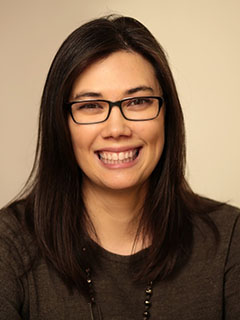Assistant Professor, University at Buffalo, New Investigators Research Grant 2021, Determining the Distance of Spreading Activation in the Phonological Network of Persons with Aphasia to Inform Selection of Treatment Generalization Probes
Mapping the Way

We all have word-finding problems every now and then. You’re thinking “cat,” but nothing comes out—you can almost see the word forming, but it just will not come. Having that happen occasionally is normal, but for some people living with aphasia, the battle can at times be constant, and debilitating. Not being able to communicate effectively with friends and family can be isolating and diminishes the quality of life. And that’s where Nichol Castro’s study, “Determining the Distance of Spreading Activation in the Phonological Network of Persons with Aphasia to Inform Selection of Treatment Generalization Probes,” comes in.
“I feel like I'm someone who's a little bit above average in the number of word retrieval problems for a neurotypical adult,” Castro explains. “I should not have this many problems, but here I am, and I stumble over my words and that was always interesting to me. Like, why does this happen? I know what I want to say, why can't I just say it?”
Castro, a 2021 recipient of the ASHFoundation New Investigators Research Grant, is exploring how individuals organize and recall words in their mental dictionary. As she describes, the way an individual creates categories of words depends on many factors, including life experiences and languages. Some people may organize words by relationship, like “cat” being related to “dog.” Others might organize words phonetically such as “cat” being related to “mat.” Discovering how an individual’s mental dictionary works, she explains, could be a key to how they receive the most effective and appropriate treatment.
“If we know that, then we can maybe make some decisions about which words are the best words to treat and how to treat them.” Castro explains. “We only have so much time in a therapy session, only so many therapy sessions we can give someone. We have got to use our time wisely.”
Castro’s interest in aphasia began as an undergraduate student at the University of Colorado, Colorado Springs, with her own firsthand experiences. She noticed that she sometimes had difficulty getting words out and wondered why. So, she began learning about cognitive psychology and word retrieval problems and says it just “snowballed from there.” She found herself doing more clinically focused work that, at first, was very theory-based using computer models. But eventually she knew the human element was missing and she needed to test these theories on people. When she began to think of a clinical population that might be appropriate for her research questions, and benefit from the anticipated research outcomes, she began focusing on people with aphasia.
“We wanted to get to the folks who are really experiencing this as a major difficulty in their everyday communication so we could think more carefully about what's happening, why that's happening, and what can we do about it?”
Castro began by looking for ways to map an individual’s mental lexicon dictionaries using word games. Because mental lexicons are quite large, many models of language are “tiny toy” models, called “toy” because they might include up to six hypothetical words. Instead, Castro’s team used different word games to include thousands of words in their models to better reflect a person’s mental dictionary and discover how people connect words mentally. As technology continues to progress, her team can now map a person’s lexicon on a much larger scale, which will be critical for identifying the best words to target in treatment for that specific person.
Much of the success of this initial research was thanks to the New Investigators Research Grant she received from the ASHFoundation. As new faculty in 2020, this research project was Castro’s first, but getting the lab started and finding people to participate in the research was going to be challenging, especially with the COVID pandemic in full swing. The grant funding helped Castro build her lab, identify study participants, albeit virtual initially, and begin data collection.
“This was one of my big projects and the first research opportunity I could offer people that I was starting to make connections with and say here, here we go,” says Castro. “[The funding] was integral to getting this going so this was a big grant for me in that way. We were able to get the information out and get people involved. Every dollar goes a long way in research.”
Fast forward to four years later; the data collected from Castro’s initial project is in press and her team is “super excited” to move on to the next phase to take the knowledge they have acquired and apply it to treatment approaches. And that is where the rubber hits the road, says Castro. For her, the goal is not to see her research published and “just sit there,” – she wants to see it help people with aphasia. She recalls a moment when one of her research participants who had been struggling with single words and had been practicing a repetition exercise had a breakthrough moment and was able to produce a full sentence about his plans for the weekend.
“The sentence just came out and I'm blinking like in the moment … he just said this full, beautiful, long sentence and he was, like, whoa, wait, what? Did that just happen?” she recalls. “And then we were all thinking, whoa, something IS happening here.”
VIEW MORE RECIPIENT SPOTLIGHTS